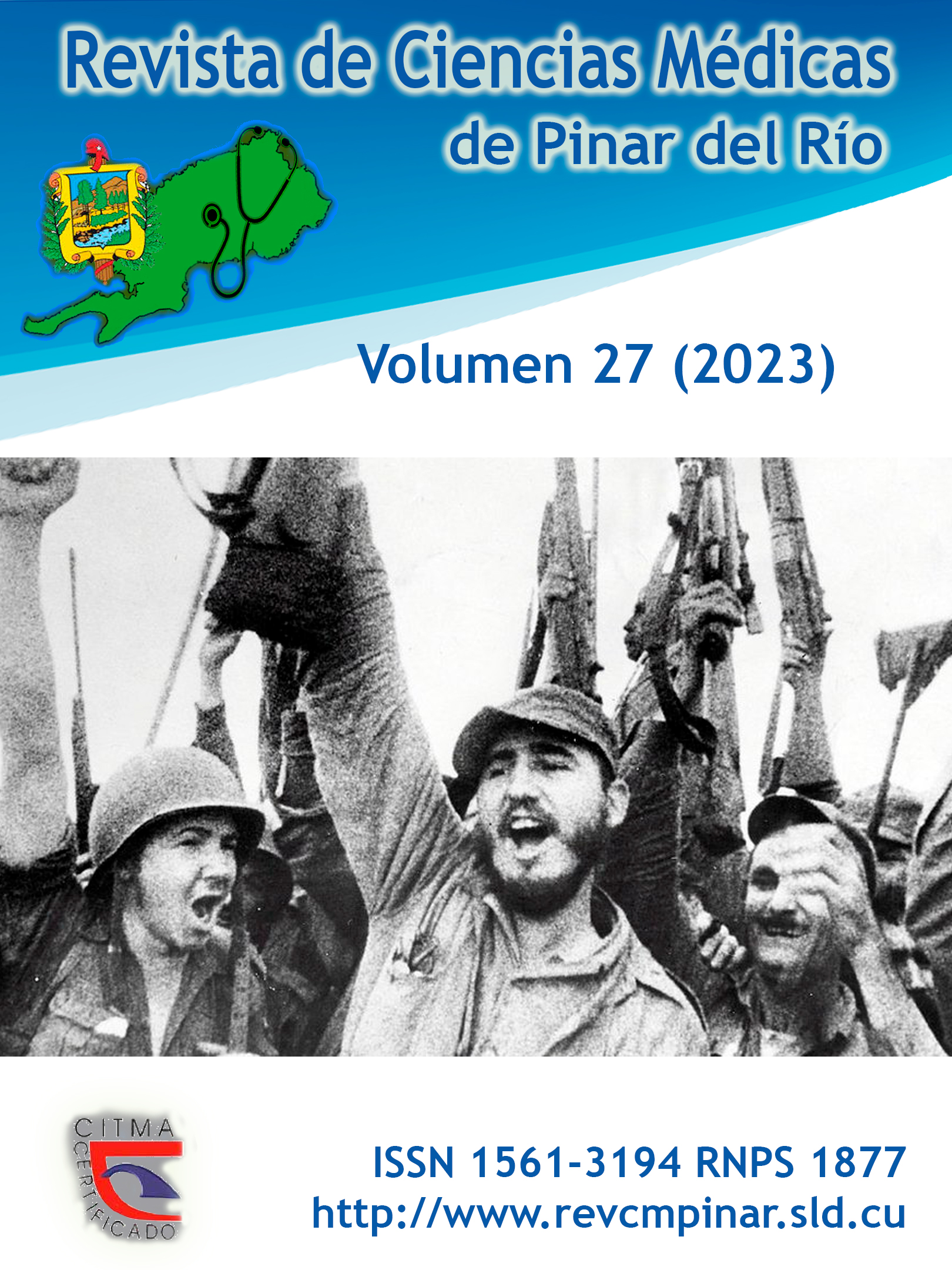Respuesta afectiva de estudiantes universitarios de medicina frente a metodologías activas de aprendizajes
Palabras clave:
APRENDIZAJE, TRABAJO COLABORATIVO, METODOLOGÍAS, APRENDIZAJE BASADO EN PROBLEMAS.Resumen
Introducción: los estudiantes valoraron positivamente el aprendizaje centrado en metodología activas y situadas en su quehacer profesional, que les permitió desarrollar competencias que proporcionan al discente mayor autonomía y autodirección para el logro de aprendizajes significativos que contribuyen a potenciar sus procesos cognitivos y actitudinales.
Objetivo: determinar la respuesta afectiva de los estudiantes de la carrera de Medicina a la aplicación de metodologías activas como el ABP, ABPO y EC para el logro de aprendizajes.
Métodos: diseño cuasi-experimental de corte longitudinal con un grupo control y tres grupos experimentales, realizado en 2019. Muestra de 84 alumnos de la carrera de Medicina de una universidad chilena. Se aplicó metodologías activas a tres grupos experimentales y clase expositiva tradicional al grupo control. La Escala de Diferencial Semántico (EDS), midió la reacción afectiva de los estudiantes en tres fases (pre-test, post-test y post-test diferido).
Resultados: la aplicación de las metodologías activas (ABP, ABPO y EC) determinó una respuesta afectiva positiva de los estudiantes de la carrera de Medicina. Hubo diferencias estadísticamente significativas (p< ,05) entre el pre-test y post-test y entre el post-test y post-test diferido.
Conclusiones: los discentes asignaron una valoración positiva a las tres metodologías activas de ABP, ABPO y EC en función del logro del aprendizaje. La metodología de ABP fue estadísticamente significativa (p<,05) en todas las dimensiones de EDS. El estudiante percibe una mayor preocupación por su aprendizaje, y establece un compromiso valorativo mayor, lo que se fortaleció a través del tiempo.
Descargas
Citas
1. López MA. El espacio europeo de educación superior y su impacto en la evaluación del proceso enseñanza-aprendizaje. Educación Temática Digital, Campinas [Internet]. 2007 [Citado 14/03/2022]; 9(esp.): 50-67. Disponible en: https://dialnet.unirioja.es/servlet/articulo?codigo=4856388
2. Díaz WM. Formación del profesorado universitario, evolución de la actividad docente, recursos y promoción profesional. Estudios Pedagógicos [Internet]. 2016 [Citado 14/03/2022]; 42(1): 65-85. Disponible en: http://www.redalyc.org/articulo.oa?id=173547563005
3. March F. Metodologías activas para la formación de competencias. Universidad Politécnica de Valencia. Education siglo XXI [Internet]. 2006 [Citado 08/03/2022]; 24: 35-36. Disponible en: https://revistas.um.es/educatio/article/view/152
4. Arias Gundín O, Fidalgo R, Robledo P, Álvarez L. Análisis de la efectividad del Aprendizaje Basado en Problemas en el desarrollo de competencias. Actas do X Congreso Internacional Galego-Portugues de Psicopedagogía [Internet]. Braga: Universidad do Minho; 2009 [Citado 12/04/2022]: 2666-2678. Disponible en: https://www.educacion.udc.es/grupos/gipdae/documentos/congreso/xcongreso/pdfs/t7/t7c195.pdf
5. Robledo P, Fidalgo R, Arias O, Álvarez M. Percepción de los estudiantes sobre el desarrollo de competencias a través de diferentes metodologías activas. Revista de Investigación Educativa [Internet]. 2015 [Citado 12/04/2022]; 33(2): 369-383. Disponible en: https://doi.org/10.6018/rie.33.2.201381
6. Pilcher J. Problem-based learning in the NICU. Neonatal Netw [Internet]. 2014 [Citado 08/03/2022]; 33(4): 221-224. Disponible en: https://connect.springerpub.com/content/sgrnn/33/4/221
7. Díez García P, Robledo Álvarez. Percepción de metodologías docentes y desarrollo de competencias al EEES. Boletín de Psicología [Internet]. 2010 [Citado 08/03/2022]; (99): 45-69. Disponible en:
8. Sánchez SS. Diferencial semántico y actitudes. Un estudio sociológico entre estudiantes de bachillerato. El BASILISCO: Revista de materialismo filosófico [Internet]. 1979 [Citado 12/04/2022]; (6): 9-17. Disponible en: https://dialnet.unirioja.es/descarga/articulo/2979231.pdf.
9. García Varcálcel A, Basilotta Gómez V. Aprendizaje basado en proyectos (ABP): evaluación desde la perspectiva de alumnos de Educación Primaria. Revista de Investigación Educativa [Internet]. 2017 [Citado 14/03/2022]; 35(1): 113-131. Disponible en: http://dx.doi.org/10.6018/rie.35.1.246811
10. Manosalvas MI, Herrera LA, Cárdenas SO. El Estudio de caso como metodología para el desarrollo de la inteligencia hermenéutica-pragmática en ciencias administrativas. Revista Científica Mundo de la Investigación y el Conocimiento [Internet]. 2018 [Citado 14/03/2022]; 2(1): 362-373. Disponible en: https://doi.org/10.26820/recimundo/2.1.2018.362-373
11. Meléndez RE. El estudio de casos como estrategia didáctica en la carrera de administración pública de la Universidad de Costa Rica. Dissertare: Revista de Investigación en Ciencias Sociales [Internet]. 2018 [Citado 15/05/2022]; 3(1): 5-32. Disponible en: https://revistas.uclave.org/index.php/dissertare/article/view/1957
12. Alsina M, Mallol C, Alsina A. Currículum Competencial y Educación Artística en Secundaria. Resultados de una experiencia de cocreación basada en el ABP. ArtsEduca [Internet]. 2020 [Citado 08/04/2022]; 26: 104-117. Disponible en: http://www.e-revistes.uji.es/index.php/artseduca/article/view/4421
13. Meroño L, Calderón A, Arias-Estero JL, Méndez-Jiménez A. Percepción de alumnado y profesorado de Educación Primaria sobre el aprendizaje de los estudiantes basado en competencias. Cultura y Educación [Internet]. 2018 [Citado 15/05/2022]; 30(1): 18-37. Disponible en: https://dialnet.unirioja.es/servlet/articulo?codigo=6352913
14. Hernández S, Fernández C, Baptista L. Metodología de la investigación. Álvaro Obregón, México: Editorial McGrawHill; 2014.
15. Gómez M. Introducción a la metodología de la investigación científica. Córdoba, Argentina: Editorial Brujas; 2014.
16. Pérez GO, Arango MD, Branch JW. El semántico diferencial como propuesta metodológica para caracterizar el liderazgo en una organización. Dynarev.fac.nac.minas [Internet]. 2008 [Citado 12/04/2022]; 75(155): 15-27. Disponible en: http://www.scielo.org.co/scielo.php?script=sci_abstract&pid=S0012-73532008000200002&lng=en&nrm=iso&tlng=es
17. García HA, Arrieta A. Potencialización del pensamiento crítico a través de la hipotemetacomprensión textual (HMT). Cultura, Educación y Sociedad [Internet]. 2016 [Citado 15/05/2022]; 7(2): 54-71. Disponible en: https://revistascientificas.cuc.edu.co/culturaeducacionysociedad/article/view/1102
18. Sánchez J. Aprendizaje basado en problemas en la formación de los estudiantes de postgrado de obstetricia y ginecología [Tesis Doctoral]. Universidad Pedagógica Nacional. Repositorio Institucional de la Universidad Pedagógica Nacional, Bogotá; 2017 [Citado 15/05/2022]. Disponible en: http://hdl.handle.net/20.500.12209/9299
Descargas
Publicado
Cómo citar
Número
Sección
Licencia
Aquellos autores/as que tengan publicaciones con esta revista, aceptan los términos siguientes:- Los autores/as conservarán sus derechos de autor y garantizarán a la revista el derecho de primera publicación de su obra, el cuál estará simultáneamente sujeto a la Licencia de reconocimiento de Creative Commons que permite a terceros compartir la obra siempre que se indique su autor y su primera publicación esta revista.
- Los autores/as podrán adoptar otros acuerdos de licencia no exclusiva de distribución de la versión de la obra publicada (p. ej.: depositarla en un archivo telemático institucional o publicarla en un volumen monográfico) siempre que se indique la publicación inicial en esta revista.
- Se permite y recomienda a los autores/as difundir su obra a través de Internet (p. ej.: en archivos telemáticos institucionales o en su página web) antes y durante el proceso de envío, lo cual puede producir intercambios interesantes y aumentar las citas de la obra publicada. (Véase El efecto del acceso abierto).



